I had an idyllic suburban upbringing on the edge of the wide open countryside of sunny South Gloucestershire. Hot summer days were spent riding for miles on the edge of the Cotswolds, before coming home to a nice house, with a nice garden, a shed, a garage and quiet, suburban safety. The most violent thing I experienced growing up in our commuter belt small town was a heron stealing my gold fish from the garden pond.
But I was a rebellious kind of kid. I liked taking the bus to Bristol (an hour away) without telling my parents, thinking the regional capital - and myself - to be terribly cosmopolitan. I'd drink coffees by the harbour and watch the people go by and listen to Suburbia by the Pet Shop Boys on my Sony Walkman tape cassette player as the city life buzzed around me, and begin to resent having to go home to the crushing quiet of my idyllic child home.
I wanted to live in a city then, and I've been lucky enough to live in large towns and cities ever since. But I'm acutely aware that there are many people who'd chose the peace and quiet of suburbia over the grime and noise of the city any day. Plenty of people like their three bedroom homes and garages big enough for three cars...
Suburbia is in itself a relatively new concept; it's only since the means of being able to travel longer distances quickly that it has even become a possibility. The first suburbs grew up around commuter rail routes, and later along fast roads which could speed you to centres of employment. After the war, as personal wealth grew and cars got faster and cheaper, our suburbs were built quickly and cheaply. But does the model work? With such a reliance on the car, and not nearly as many transport options as city centres and such larger distances between destinations (thus discouraging cycling and walking) can we ever create a sustainable suburbia?
November's Street Talks is next Tuesday the 2nd, upstairs at the Yorkshire Grey pub with Richard Hebditch and Richard Bourn from the Campaign for Better Transport. With all candidates in next year's Mayoral race looking to secure valuable outer London votes, they'll be talking on how outer London is different, what can be done to encourage change in travel patterns and what those 2012 vote chasers will need to do to set out a convincing vision for sustainable travel in suburban London.
The bar is open for food and drinks from around 6, for beer, dinner and networking with the talk taking place at 7PM.
Missed a previous Street Talk? You can listen again to all previous presentations, including last month's by Oliver Schulze from Gehl Architects here.
You can follow the Movement for Liveable London on Twitter, and live tweet during the talk using the hashtag #streettalks
Share |
There were lots of these where I grew up.
But I was a rebellious kind of kid. I liked taking the bus to Bristol (an hour away) without telling my parents, thinking the regional capital - and myself - to be terribly cosmopolitan. I'd drink coffees by the harbour and watch the people go by and listen to Suburbia by the Pet Shop Boys on my Sony Walkman tape cassette player as the city life buzzed around me, and begin to resent having to go home to the crushing quiet of my idyllic child home.
I wanted to live in a city then, and I've been lucky enough to live in large towns and cities ever since. But I'm acutely aware that there are many people who'd chose the peace and quiet of suburbia over the grime and noise of the city any day. Plenty of people like their three bedroom homes and garages big enough for three cars...
Can we ever make suburbia truly sustainable for all?
Suburbia is in itself a relatively new concept; it's only since the means of being able to travel longer distances quickly that it has even become a possibility. The first suburbs grew up around commuter rail routes, and later along fast roads which could speed you to centres of employment. After the war, as personal wealth grew and cars got faster and cheaper, our suburbs were built quickly and cheaply. But does the model work? With such a reliance on the car, and not nearly as many transport options as city centres and such larger distances between destinations (thus discouraging cycling and walking) can we ever create a sustainable suburbia?
November's Street Talks is next Tuesday the 2nd, upstairs at the Yorkshire Grey pub with Richard Hebditch and Richard Bourn from the Campaign for Better Transport. With all candidates in next year's Mayoral race looking to secure valuable outer London votes, they'll be talking on how outer London is different, what can be done to encourage change in travel patterns and what those 2012 vote chasers will need to do to set out a convincing vision for sustainable travel in suburban London.
The bar is open for food and drinks from around 6, for beer, dinner and networking with the talk taking place at 7PM.
Missed a previous Street Talk? You can listen again to all previous presentations, including last month's by Oliver Schulze from Gehl Architects here.
You can follow the Movement for Liveable London on Twitter, and live tweet during the talk using the hashtag #streettalks
Share |






4 comments:
Hi Mark,
On the site it says Tuesday 1st, rather than Tuesday 2nd.
See you there
Jono
I liked the poetic insight into your early life. Nice entry.
-ryan
I'm vaguely guessing you're from Yate. (Am I right?)
The only other place I can think of is Bradley Stoke, aka "Sadly Broke", but it isn't very much of a place, as I got hideously lost cycling there trying to find a Tesco there while doing booze - er, I mean grocery - shopping and realised that I might as well have been in Milton Keynes if I wanted to use badly signed cycle paths and look at cookie cutter cul-de-sacs while getting lost at identical roundabouts next to identikit houses.
Bradley Stoke is probably a good example of mediocre suburbia (the sort the talk will be about) that was no doubt planned meticulously but has about as much charm and touristic appeal as a filing cabinet.
@Jono Yes, silly me, Tuesday 1st!
@christthebull Hope University is going well for you and you're enjoying life in the west country. You made a very good guess; I grew up in a smaller town that borders on to Yate and had similar 1970s 'new town' housing stock, and indeed went to school in Yate.
Post a Comment